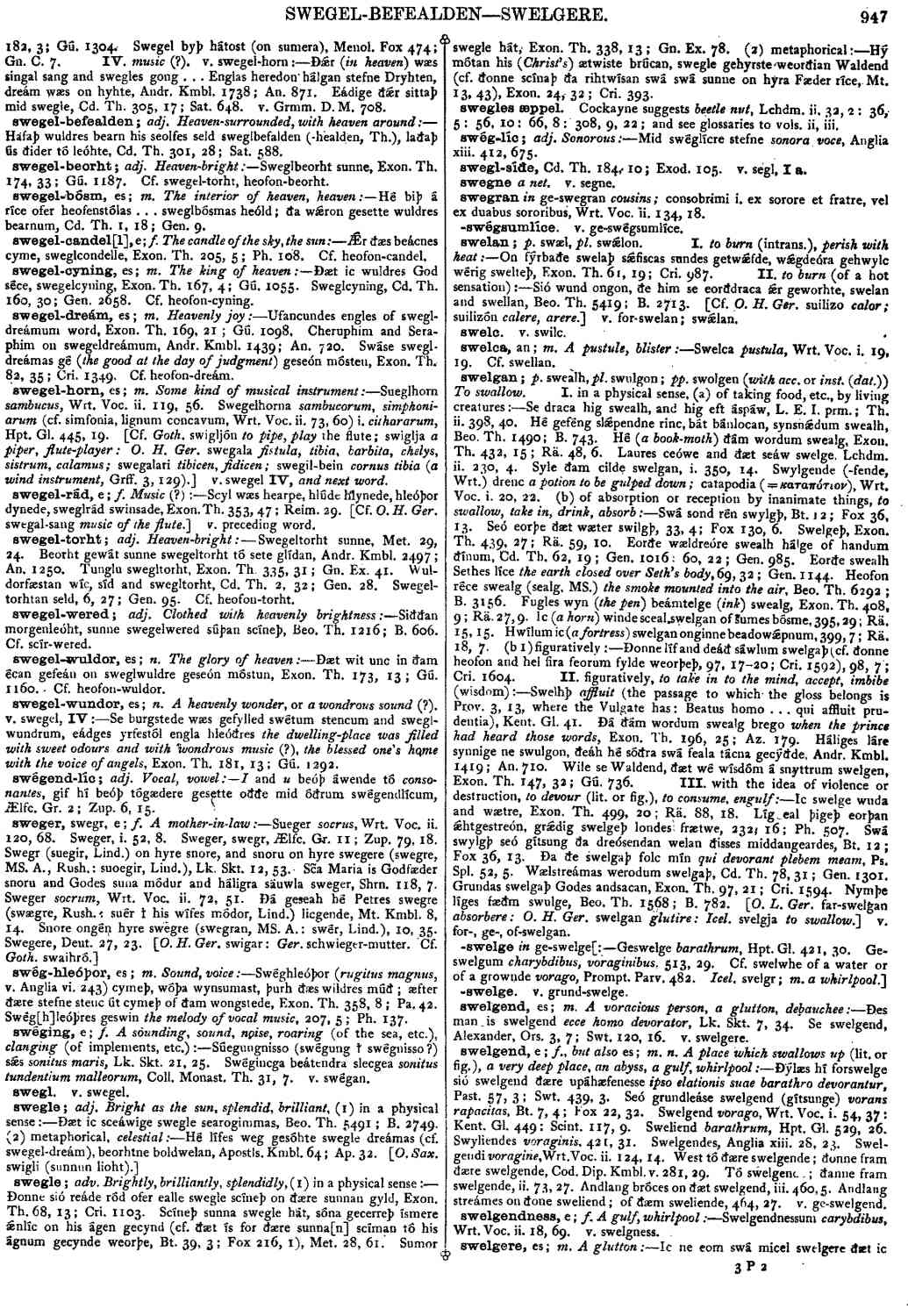swelgan
- verb [ strong ]
-
Se draca hig swealh, and hig eft áspáw,
- L.E.I. prm.; Th. ii. 398, 40.
-
Hé geféng slǽpendne rinc, bát bánlocan, synsnǽdum swealh,
- Beo. Th. 1490; B. 743.
-
Hé (
a book-moth
) ðám wordum swealg,- Exon. Th. 432, 15; Rä. 48, 6.
- Laures ceówe and ðæt seáw swelge. Lchdm. ii. 230, 4.
- Syle ðam cilde swelgan, i. 350, 14.
-
Swylgende (-fende, Wrt.) drenc
a potion to be gulped down; catapodia (καταπότιον ),
- Wrt. Voc. i. 20, 22.
-
Swá sond rén swylgþ,
- Bt. 12; Fox 36, 13.
-
Seó eorþe ðæt wæter swilgþ,
- 33, 4; Fox 130, 6.
-
Swelgeþ,
- Exon. Th. 439, 27; Rä. 59, 10.
-
Eorðe wældreóre swealh hálge of handum ðínum,
- Cd. Th. 62, 19; Gen. 1016: 60, 22; Gen. 985.
-
Eorðe swealh Sethes líce
the earth closed over Seth's body
,- 69, 32; Gen. 1144.
-
Heofon réce swealg (sealg, MS.)
the smoke mounted into the air.
- Beo. Th. 6292; B. 3156.
-
Fugles wyn (
the pen) beámtelge (ink) swealg, Exon. Th. 408, 9; Rä. 27, 9. lc(a horn )
windesceal swelgan of sumes bósme,- 395, 29; Rä. 15, 15.
-
Hwílumic(
a fortress
)swelgan onginne beadowǽpnum,- 399, 7; Rä. 18, 7. (b 1) figuratively :--
-
Swelhþ
affluit
(the passage to which the gloss belongs is- Prov. 3, 13, where the Vulgate has: Beatus homo ... qui affluit prudentia), Kent. Gl. 41.
-
Ðá ðam wordum swealg brego
when the prince had heard those words,
- Exon. Th. 196, 25; Az. 179.
- Háliges láre synnige ne swulgon, ðeáh hé sóðra swá feala tácna gecýðde. Andr. Kmbl. 1419; An. 710.
-
Wile se Waldend, ðæt wé wisdom á snyttrum swelgen,
- Exon. Th. 147, 32; Gú. 736.
-
Ic swelge wuda and wætre. Exon. Th. 499,
- 20; Rä. 88, 18.
-
Líg eal þigeþ eorþan ǽhtgestreón, grǽdig swelgeþ londes frætwe,
- 232; 16; Ph. 507.
-
Swá swylgþ seó gítsung ða dreósendan welan ðisses middangeardes,
- Bt. 12; Fox 36, 13.
-
Ða ðe swelgaþ folc mín
qui devorant plebem meam,
- Ps. Spl. 52, 5.
-
Wælstreámas werodum swelgaþ. Cd. Th. 78,
- 31; Gen. 1301.
-
Grundas swelgaþ Godes andsacan. Exon. Th. 97,
- 21; Cri. 1594.
-
Nymþe líges fæðm swulge,
- Beo. Th. 1568; B. 782.
Bosworth, Joseph. “swelgan.” In An Anglo-Saxon Dictionary Online, edited by Thomas Northcote Toller, Christ Sean, and Ondřej Tichy. Prague: Faculty of Arts, Charles University, 2014. https://bosworthtoller.com/29645.
Checked: 0